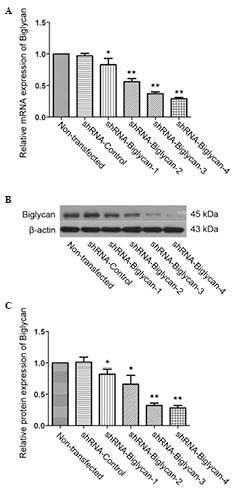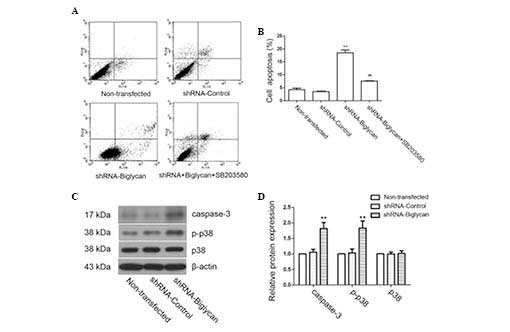|
1
|
Parkin DM, Bray F, Ferlay J and Pisani P:
Global cancer statistics, 2002. CA Cancer J Clin. 55:74–108. 2005.
View Article : Google Scholar : PubMed/NCBI
|
|
2
|
Cheng H, Zhang L, Cogdell DE, Zheng H,
Schetter AJ, Nykter M, Harris CC, Chen K, Hamilton SR and Zhang W:
Circulating plasma MiR-141 is a novel biomarker for metastatic
colon cancer and predicts poor prognosis. PloS One. 6:e177452011.
View Article : Google Scholar : PubMed/NCBI
|
|
3
|
Yang L, Parkin DM, Ferlay J, Li L and Chen
Y: Estimates of cancer incidence in China for 2000 and projections
for 2005. Cancer Epidemiol Biomarkers Prev. 14:243–250.
2005.PubMed/NCBI
|
|
4
|
Jemal A, Bray F, Center MM, Ferlay J, Ward
E and Forman D: Global cancer statistics. CA Cancer J Clin.
61:69–90. 2011. View Article : Google Scholar : PubMed/NCBI
|
|
5
|
Wadhwa S, Embree MC, Bi Y and Young MF:
Regulation, regulatory activities and function of biglycan. Crit
Rev Eukaryot Gene Expr. 14:301–315. 2004. View Article : Google Scholar
|
|
6
|
Ameye L, Aria D, Jepsen K, Oldberg A, Xu T
and Young MF: Abnormal collagen fibrils in tendons of
biglycan/fibro-modulin-deficient mice lead to gait impairment,
ectopic ossification and osteoarthritis. FASEB J. 16:673–680. 2002.
View Article : Google Scholar : PubMed/NCBI
|
|
7
|
Young MF, Bi Y, Ameye L and Chen XD:
Biglycan knockout mice: New models for musculoskeletal diseases.
Glycoconj J. 19:257–262. 2002. View Article : Google Scholar
|
|
8
|
Nishino R, Honda M, Yamashita T, Takatori
H, Minato H, Zen Y, Sasaki M, Takamura H, Horimoto K, Ohta T, et
al: Identification of novel candidate tumour marker genes for
intrahepatic cholangiocarcinoma. J Hepatol. 49:207–216. 2008.
View Article : Google Scholar : PubMed/NCBI
|
|
9
|
Pan S, Cheng L, White JT, Lu W, Utleg AG,
Yan X, Urban ND, Drescher CW, Hood L and Lin B: Quantitative
proteomics analysis integrated with microarray data reveals that
extracellular matrix proteins, catenins and p53 binding protein 1
are important for chemotherapy response in ovarian cancers. OMICS.
13:345–354. 2009. View Article : Google Scholar : PubMed/NCBI
|
|
10
|
Liu Y, Li W, Li X, Tai Y, Lü Q, Yang N and
Jiang J: Expression and significance of biglycan in endometrial
cancer. Arch Gynecol Obstet. 289:649–655. 2014. View Article : Google Scholar
|
|
11
|
Aprile G, Avellini C, Reni M, Mazzer M,
Foltran L, Rossi D, Cereda S, Iaiza E, Fasola G and Piga A:
Biglycan expression and clinical outcome in patients with
pancreatic adenocarcinoma. Tumour Biol. 34:131–137. 2013.
View Article : Google Scholar
|
|
12
|
Hu L, Duan YT, Li JF, Su LP, Yan M, Zhu
ZG, Liu BY and Yang QM: Biglycan enhances gastric cancer invasion
by activating FAK signaling pathway. Oncotarget. 5:1885–1896. 2014.
View Article : Google Scholar : PubMed/NCBI
|
|
13
|
Gu X, Ma Y, Xiao J, Zheng H, Song C, Gong
Y and Xing X: Up-regulated biglycan expression correlates with the
malignancy in human colorectal cancers. Clin Exp Med. 12:195–199.
2012. View Article : Google Scholar
|
|
14
|
Weber CK, Sommer G, Michl P, Fensterer H,
Weimer M, Gansauge F, Leder G, Adler G and Gress TM: Biglycan is
overexpressed in pancreatic cancer and induces G1-arrest in
pancreatic cancer cell lines. Gastroenterology. 121:657–667. 2001.
View Article : Google Scholar : PubMed/NCBI
|
|
15
|
Recktenwald CV, Leisz S, Steven A, Mimura
K, Müller A, Wulfänger J, Kiessling R and Seliger B:
HER-2/neu-mediated down-regulation of biglycan associated with
altered growth properties. J Biol Chem. 287:24320–24329. 2012.
View Article : Google Scholar : PubMed/NCBI
|
|
16
|
Makatsori E, Lamari FN, Theocharis AD,
Anagnostides S, Hjerpe A, Tsegenidis T and Karamanos NK: Large
matrix proteoglycans, versican and perlecan, are expressed and
secreted by human leukemic monocytes. Anticancer Res. 23:3303–3309.
2003.PubMed/NCBI
|
|
17
|
Hu L, Duan YT, Li JF, Su LP, Yan M, Zhu
ZG, Liu BY and Yang QM: Biglycan enhances gastric cancer invasion
by activating FAK signaling pathway. Oncotarget. 5:1885–1896. 2014.
View Article : Google Scholar : PubMed/NCBI
|
|
18
|
Xia Z, Dickens M, Raingeaud J, Davis RJ
and Greenberg ME: Opposing effects of ERK and JNK-p38 MAP kinases
on apoptosis. Science. 270:1326–1331. 1995. View Article : Google Scholar : PubMed/NCBI
|
|
19
|
Zhu YH, Yang F, Zhang SS, Zeng TT, Xie X
and Guan XY: High expression of biglycan is associated with poor
prognosis in patients with esophageal squamous cell carcinoma. Int
J Clin Exp Pathol. 6:2497–2505. 2013.PubMed/NCBI
|
|
20
|
Wang B, Li GX, Zhang SG, Wang Q, Wen YG,
Tang HM, Zhou CZ, Xing AY, Fan JW, Yan DW, et al: Biglycan
expression correlates with aggressiveness and poor prognosis of
gastric cancer. Exp Biol Med (Maywood). 236:1247–1253. 2011.
View Article : Google Scholar
|
|
21
|
Theocharis AD and Karamanos NK: Decreased
biglycan expression and differential decorin localization in human
abdominal aortic aneurysms. Atherosclerosis. 165:221–230. 2002.
View Article : Google Scholar : PubMed/NCBI
|
|
22
|
Gupta GP and Massague J: Cancer
metastasis: Building a framework. Cell. 127:679–695. 2006.
View Article : Google Scholar : PubMed/NCBI
|
|
23
|
Lu P, Weaver VM and Werb Z: The
extracellular matrix: A dynamic niche in cancer progression. J Cell
Biol. 196:395–406. 2012. View Article : Google Scholar : PubMed/NCBI
|
|
24
|
Stetler-Stevenson WG, Aznavoorian S and
Liotta LA: Tumor cell interactions with the extracellular matrix
during invasion and metastasis. Annu Rev Cell Biol. 9:541–573.
1993. View Article : Google Scholar : PubMed/NCBI
|
|
25
|
Shimizu-Hirota R, Sasamura H, Kuroda M,
Kobayashi E, Hayashi M and Saruta T: Extracellular matrix
glycoprotein biglycan enhances vascular smooth muscle cell
proliferation and migration. Circ Res. 94:1067–1074. 2004.
View Article : Google Scholar : PubMed/NCBI
|
|
26
|
Yamamoto K, Ohga N, Hida Y, Maishi N,
Kawamoto T, Kitayama K, Akiyama K, Osawa T, Kondoh M, Matsuda K, et
al: Biglycan is a specific marker and an autocrine angiogenic
factor of tumour endothelial cells. Br J Cancer. 106:1214–1223.
2012. View Article : Google Scholar : PubMed/NCBI
|
|
27
|
Xing X, Gu X, Ma T and Ye H: Biglycan
up-regulated vascular endothelial growth factor (VEGF) expression
and promoted angiogenesis in colon cancer. Tumor Biol.
36:1773–1780. 2015. View Article : Google Scholar
|
|
28
|
Wagner EF and Nebreda AR: Signal
integration by JNK and p38 MAPK pathways in cancer development. Nat
Rev Cancer. 9:537–549. 2009. View
Article : Google Scholar : PubMed/NCBI
|
|
29
|
Babelova A, Moreth K, Tsalastra-Greul W,
Zeng-Brouwers J, Eickelberg O, Young MF, Bruckner P, Pfeilschifter
J, Schaefer RM, Gröne HJ and Schaefer L: Biglycan, a danger signal
that activates the NLRP3 inflammasome via toll-like and P2X
receptors. J Biol Chem. 284:24035–24048. 2009. View Article : Google Scholar : PubMed/NCBI
|
|
30
|
Schaefer L, Babelova A, Kiss E, Hausser
HJ, Baliova M, Krzyzankova M, Marsche G, Young MF, Mihalik D, Götte
M, et al: The matrix component biglycan is proinflammatory and
signals through Toll-like receptors 4 and 2 in macrophages. J Clin
Invest. 115:2223–2233. 2005. View
Article : Google Scholar : PubMed/NCBI
|


















